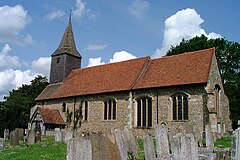Kemsing, Kent
| Kemsing | |
|---|---|
 Church of St Mary |
|
| Kemsing shown within Kent | |
| Population | 4,014 (2001) 4,218 (2011) |
| OS grid reference | TQ545591 |
| District | |
| Shire county | |
| Region | |
| Country | England |
| Sovereign state | United Kingdom |
| Post town | Sevenoaks |
| Postcode district | TN15 |
| Dialling code | 01732 and 01959 |
| Police | Kent |
| Fire | Kent |
| Ambulance | South East Coast |
| EU Parliament | South East England |
Kemsing is a village and civil parish in the Sevenoaks District of Kent, England. The parish is twinned with Compton and lies on the scarp face of the North Downs, 20 miles south east of Central London, 4 miles (6 km) north east of Sevenoaks. Also in the parish are the hamlets of Heaverham, 1 mile (2 km) to the east, and Noah's Ark 0.5 miles (1 km) to the south. The population of the civil parish in 2001 was 4014 persons, increasing to a population of 4,218 at the 2011 Census.
Kemsing was the birthplace, in AD961, of Saint Edith of Wilton, an illegitimate daughter of the Saxon King Edgar I. The well at the centre of the village is dedicated to her, a plaque on the wall recording the local legend that her saintly presence has given the water healing properties. The historic village centre area around the well includes the war memorial, a cluster of picturesque cottages and St. Edith's Hall, the front of which is adorned with a statue of the saint and a clock which chimes the hours and bears the inscription:
'Tis mine
Each passing hour to tell.
'Tis thine
To use it ill or well.
Given the village connection with St. Edith it is perhaps surprising that the parish church, Saxon in origin, is however dedicated to St Mary the Virgin. Another local legend states that the knights who murdered Archbishop Thomas Becket rode through Kemsing on their way to seek him out at Canterbury. Following his canonisation Kemsing became a stop-off place on the Pilgrims' Way, along which pilgrims travelled to visit the saint's shrine at Canterbury Cathedral. The Women's Institute organisation opened its first institute in Kent in Kemsing in December 1915. During the first world war St Edith Hall was used as a hospital and manned by the Kent Voluntary Aid Detachment. Wounded soldiers from the western front were returned to England and the hall at Kemsing was one of many facilities in the south east of England used during the war.
...
Wikipedia

